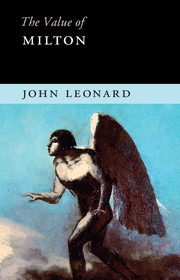Book contents
- Frontmatter
- Dedication
- Contents
- Preface
- Textual note
- 1 Areopagitica, toleration and free speech
- 2 The minor poems and ‘the power / to save’
- 3 The political prose: ‘in liberty's defence’
- 4 Paradise Lost, the sublime poem
- 5 Paradise Lost, ‘solid good’
- 6 Paradise Regained, ‘To the utmost of mere man’
- 7 Samson Agonistes, tragedy and terror
- Notes
- Index
2 - The minor poems and ‘the power / to save’
Published online by Cambridge University Press: 05 July 2016
- Frontmatter
- Dedication
- Contents
- Preface
- Textual note
- 1 Areopagitica, toleration and free speech
- 2 The minor poems and ‘the power / to save’
- 3 The political prose: ‘in liberty's defence’
- 4 Paradise Lost, the sublime poem
- 5 Paradise Lost, ‘solid good’
- 6 Paradise Regained, ‘To the utmost of mere man’
- 7 Samson Agonistes, tragedy and terror
- Notes
- Index
Summary
Despite his disdain in Areopagitica for ‘a fugitive and cloistered virtue’ that ‘never sallies out’, Milton was slow to sally out. He wrote most of his early poems under his father's roof. He did not work for a living until he was thirty and even then he worked as tutor to his nephews. When Civil War broke out, his younger brother Christopher took up arms for the king. The poet supported Parliament, but stayed home. ‘Sonnet 8’, the only poem in Poems of Mr. John Milton (1645) to mention the fact that a war is going on outside his front door, tries to keep the door closed. I begin my evaluation of Milton's poetry with this sonnet, for it ponders poetry's value in a hostile or indifferent world:
Captain or colonel, or knight in arms,
Whose chance on these defenceless doors may seize,
If deed of honour did thee ever please,
Guard them, and him within protect from harms;
He can requite thee, for he knows the charms
That call fame on such gentle acts as these,
And he can spread thy name o'er lands and seas,
Whatever clime the sun's bright circle warms.
Lift not thy spear against the Muses’ bower:
The great Emathian conqueror bid spare
The house of Pindarus, when temple and tower
Went to the ground; and the repeated air
Of sad Electra's poet had the power
To save th’ Athenian walls from ruin bare.
Milton wrote the poem early in the war, when the Royalists were advancing on London after the battle of Edgehill (23 October 1642). It is untitled in the 1645 volume, but in the Trinity manuscript it was originally titled ‘On his door when the City expected an assault’. In his 1942 novel Wife to Mr. Milton, Robert Graves presents Milton as pinning the poem to his door as a cowardly plea. This unflattering picture has had great influence. Most critics have tried to refute Graves by arguing that the poem's plea is ironic. Cleanth Brooks and John Hardy, writing a few years after Graves, insist that the ‘apparent arrogance and apparent timidity’ are ‘a joke’. Milton could never be so ‘naïve’ as to expect ‘the Royalist officer who knocked at the door to take the poem seriously’. As Campbell and Corns note, ‘the poem has deeply puzzled commentators.
- Type
- Chapter
- Information
- The Value of Milton , pp. 22 - 43Publisher: Cambridge University PressPrint publication year: 2016



